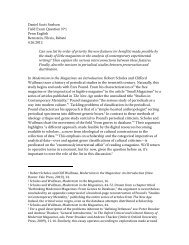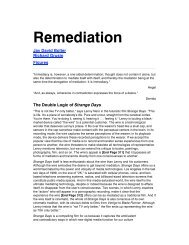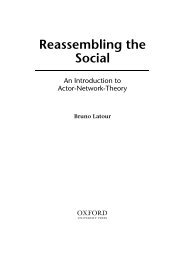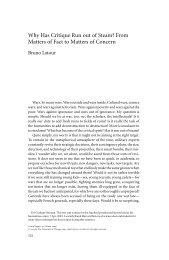The Exploit: A Theory of Networks - asounder
The Exploit: A Theory of Networks - asounder
The Exploit: A Theory of Networks - asounder
You also want an ePaper? Increase the reach of your titles
YUMPU automatically turns print PDFs into web optimized ePapers that Google loves.
150 Coda<br />
To understand the concept <strong>of</strong> the multitude in its most general and<br />
abstract form, let us contrast it first with that <strong>of</strong> the people. <strong>The</strong><br />
people is one....<strong>The</strong> people synthesizes or reduces these social dif -<br />
ferences into one identity. <strong>The</strong> multitude, by contrast, is not unified<br />
but remains plural and multiple. This is why, according to the domi -<br />
nant tradition <strong>of</strong> political philosophy, the people can rule as a<br />
sovereign power and the multitude cannot. <strong>The</strong> multitude is com -<br />
posed <strong>of</strong> a set <strong>of</strong> singularities—and by singularity here we mean a<br />
social subject whose difference cannot be reduced to sameness, a<br />
difference that remains different....<strong>The</strong> plural singularities <strong>of</strong> the<br />
multitude thus stand in contrast to the undifferentiated unity <strong>of</strong><br />
the people. 2<br />
<strong>The</strong>se terms—the one and the many, sovereignty and multitude—are<br />
at once ultracontemporary and at the same time resolutely historical.<br />
Paolo Virno, for instance, notes that such debates have evoked a “new<br />
seventeenth century,” in which the face - <strong>of</strong>f between Hobbes and Spinoza<br />
comes into the foreground. 3 Virno nuances the opposition between<br />
the one and the many and suggests that the contemporary multitude<br />
is opposed to the very opposition itself <strong>of</strong> the one and the many:<br />
And it is precisely because <strong>of</strong> the dissolution <strong>of</strong> the coupling <strong>of</strong> these<br />
terms, for so long held to be obvious, that one can no longer speak<br />
<strong>of</strong> a people converging into the unity <strong>of</strong> the state. While one does<br />
not wish to sing out - <strong>of</strong> - tune melodies in the post - modern style<br />
(“multiplicity is good, unity is the disaster to beware <strong>of</strong> ”), it is<br />
necessary, however, to recognize that the multitude does not clash<br />
with the One; rather, it redefines it. Even the many need a form <strong>of</strong><br />
unity, <strong>of</strong> being a One. But here is the point: this unity is no longer<br />
the State; rather, it is language, intellect, the communal faculties <strong>of</strong><br />
the human race. <strong>The</strong> One is no longer a promise, it is a premise. 4<br />
<strong>The</strong> multitude has a focus, a direction, but its actions and decisions<br />
are highly distributed. <strong>The</strong> “One” <strong>of</strong> the multitude is less a transcendent<br />
“One,” serving to homogenize a collectivity, and more like an<br />
immanent “One” (we would do better to say a “univocity”) that is<br />
the very possibility <strong>of</strong> collective organization.<br />
Gone are the days <strong>of</strong> centralized, uniform mass protests; instead<br />
one witnesses highly distributed, tactical modes <strong>of</strong> dissent that <strong>of</strong>ten<br />
use high and low forms <strong>of</strong> technology. <strong>The</strong> very fact that the multitude<br />
is not “One” is its greatest strength; the multitude’s inherently<br />
decentralized and even distributed character gives it a flexibility and









